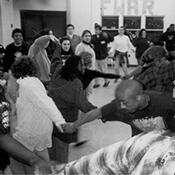 While many Jewish institutions define themselves as specifically Orthodox, Conservative, Reform, or Reconstructionist, contemporary American Judaism contains a strain of intra-Jewish pluralism, in which Jewish identity is not solely defined by denominational commitments. This strain of internal Jewish pluralism has led to a flourishing of educational and organizational opportunities for American Jews whose Jewish identity does not revolve around specific Jewish practices.
While many Jewish institutions define themselves as specifically Orthodox, Conservative, Reform, or Reconstructionist, contemporary American Judaism contains a strain of intra-Jewish pluralism, in which Jewish identity is not solely defined by denominational commitments. This strain of internal Jewish pluralism has led to a flourishing of educational and organizational opportunities for American Jews whose Jewish identity does not revolve around specific Jewish practices.
While the majority of American Jews continue to affiliate with one of the four major denominations (Orthodox, Conservative, Reconstructionist, and Reform), there are various efforts to create intra-Jewish conversation and joint action that go beyond denominational lines. Often, this intrafaith dialogue can be more difficult than interfaith work, as different groups may “compete” in their efforts to define which ideas and values their tradition holds most dear. While a move away from strict denominationalism has led some to abandon the ritual aspects of Judaism in whole or in part, many others have sought to conserve the traditions and teachings of Judaism without feeling a need to adhere to one specific denomination or label. In a sense, these Jews see themselves not in a silo but as a part of the broader Jewish community. To the question: “What kind of Jew are you?” the response might be: “I’m just Jewish.”
Institutionally, a commitment to internal pluralism has manifested itself through Clal – The National Jewish Center for Learning and Leadership, founded in 1974 by Rabbi Irving Yitz Greenberg and Elie Weisel. According to Encyclopedia Judaica, Clal aims to promote “Jewish-Jewish dialogue and intercommunication with respect between the trends in contemporary Judaism, Orthodox, Conservative, Reform, and Reconstructionist, conducted in a spirit of pluralism.” The establishment of the Hebrew College Rabbinical School (2003) in Newton, MA is a prominent example of this commitment to intrafaith engagement. Hebrew College is the only non-denominational rabbinical school that accepts Jews of any level of observance, creating a pluralistic learning environment for training the tradition’s future leaders. Many American Jews also study at the Pardes Institute of Jewish Studies in Jerusalem which accepts Jews from all backgrounds for various terms of study, although the Institute does not self-define as “pluralistic.” As these emerging Jewish leaders leave the classroom and take up professional positions in the broader Jewish community, this ethic of pluralism within Judaism will likely become more commonplace. For many—clergy and laity alike—this internal commitment to dialogue with other Jews also extends to dialogue with people of other faith traditions.
While pluralism is an emerging value in many Jewish communities in America and beyond, it is not a value advocated by all Jews. Many, in keeping with the traditional belief that study should be combined with practice, believe that it is sacrilegious to study Jewish texts without any intention of living by them (see e.g. Babylonian Talmud Berachot 17a). This tension plays out in various ways, leaving open the question of what future denominational relationships will look like as Jews of this newest generation begin to lead their communities.